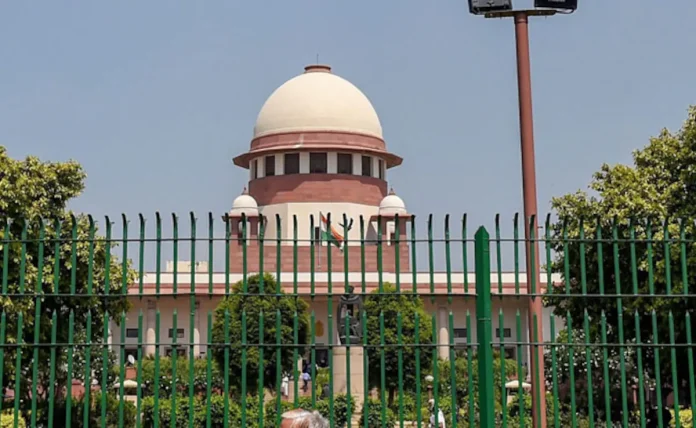Imagine a referee in a high-stakes game who refuses to blow the whistle, letting players run wild while the rulebook gathers dust. Now picture the Supreme Court stepping onto the field—not to play, but to remind everyone that the game has rules, and someone’s got to enforce them. On April 2, 2025, Justice B.R. Gavai, a towering figure in India’s judiciary, made it crystal clear: when it comes to the Constitution, the Supreme Court isn’t just a spectator. It’s the guardian with a backbone, especially when a Speaker drags their feet on anti-defection pleas.
In This Article:
The Scene: A Democracy in Limbo
The stage was set in a Supreme Court hearing that felt more like a wake-up call than a routine case. At the heart of it was Telangana, where Bharat Rashtra Samithi (BRS) leaders were banging on the court’s door, frustrated that the Assembly Speaker hadn’t acted on disqualification pleas against MLAs who’d jumped ship to the ruling Congress. For months—nearly a year—the Speaker had sat on these petitions, leaving democracy dangling like a kite caught in a tree. Enter Justice Gavai, presiding over a two-judge bench, with a question that cut through the haze: If the Speaker won’t move, are the courts supposed to just sit there twiddling their thumbs?
The Anti-Defection Law: A Shield With a Catch
Let’s rewind a bit. The Tenth Schedule—India’s anti-defection law—was stitched into the Constitution in 1985 to stop politicians from treating party loyalty like a revolving door. It’s simple: if an MLA or MP ditches their party or defies its whip, the Speaker can disqualify them. The catch? The law doesn’t set a deadline. So, a Speaker can theoretically let these pleas pile up like unread emails, and that’s exactly what’s been happening. In Telangana, the BRS claimed the Speaker’s inaction was a deliberate stall—a “naked dance of democracy,” as Justice Gavai put it—mocking the very rules meant to keep politics honest.
The opposition’s lawyer, senior advocate Mukul Rohatgi, argued that courts can only “request” the Speaker to act, not force a timeline. After all, the Speaker’s decision is a quasi-judicial call, and judicial review only kicks in once there’s a ruling to review. But Justice Gavai wasn’t buying the idea of a powerless judiciary. “If the Speaker doesn’t act for four years out of a five-year term,” he asked, “are we supposed to just watch?”
The Guardian’s Gavel: Not Just for Show
Here’s where Justice Gavai flipped the script. He didn’t just defend the Supreme Court’s role—he painted it as a living, breathing protector of the Constitution. “The courts don’t just have the power,” he said, “they have the duty to step in.” This wasn’t about overstepping; it was about accountability. If a Speaker—any constitutional figure—ignores the Supreme Court’s nudge (or “request,” as Gavai diplomatically framed it), the court has a secret weapon: Article 142. This constitutional superpower lets the court do “complete justice” when the usual rules fall short. It’s not a sledgehammer, but a scalpel—precise, rare, and undeniable.
Think of it like this: the Speaker’s a gatekeeper, but the Supreme Court’s the locksmith. If the gate’s stuck, the court doesn’t break it down—it finds a way to turn the key. Gavai’s point was blunt: no one gets to paralyze democracy and expect the judiciary to shrug.
A Jab at the Top: The CM’s Misstep
The hearing took a spicy turn when Justice Gavai zeroed in on Telangana Chief Minister Revanth Reddy. Reddy had boasted on the Assembly floor that no bypolls would happen even if MLAs switched sides—a wink at defection without consequences. “Your Honourable Chief Minister is making a mockery of the Tenth Schedule,” Gavai told Rohatgi, his tone sharp enough to slice through the courtroom’s tension. It was a rare moment: a Supreme Court judge calling out a CM mid-hearing, not with legalese, but with a plain-spoken jab that anyone could grasp. The message? The Constitution isn’t a punching bag for political games.
Why This Matters: Beyond the Bench
This isn’t just a dusty legal spat—it’s about who keeps democracy’s heart beating. The anti-defection law exists to stop horse-trading, but if Speakers can dawdle indefinitely, it’s a paper tiger. Justice Gavai’s stance flips that on its head: the Supreme Court isn’t here to beg; it’s here to guard. And it’s not powerless—it’s patient, until it isn’t.
Picture a tug-of-war between power and principle. On one side, politicians and Speakers flexing their muscle; on the other, the Constitution, with the Supreme Court as its muscle. Gavai’s words were a reminder that the rope’s not endless—eventually, the court pulls back.
The Gavai Touch: Simple, Strong, Human
What makes this stand out? Justice Gavai didn’t drown us in jargon or case citations. He spoke like a teacher breaking down a tough lesson: clear, direct, and with a dash of fire. “Should the court tie its hands and watch?” he asked. It’s a question that sticks—not because it’s fancy, but because it’s real. He’s not some distant judge in a robe; he’s a voice saying what plenty of us feel when democracy stumbles: someone’s got to do something.
The Bigger Picture: A Wake-Up Call
This isn’t just about Telangana or the BRS—it’s a flare shot into the sky for every state where defection’s a sport and Speakers play possum. Justice Gavai’s take isn’t a power grab; it’s a promise. The Supreme Court, as the Constitution’s guardian, won’t let democracy choke on inaction. If the Speaker won’t whistle, the court will—and it’s got the lungs to make it heard.
-By Manoj H




